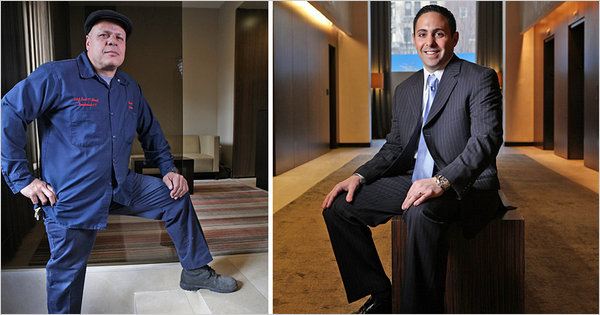


Penmark Property Advisors, LLC
The Super Comes Out of the Basement

Chester Higgins Jr./The New York Times
SUPER SUPERS Greg Capizzi, right, the superintendent at 20 Pine Street in Lower Manhattan, changes to coveralls when necessary. Carlos Irizarry, the super at 233 East 17th Street, was hired for his familiarity with the building’s sophisticated systems.
By JULIE SATOW
Published: February 25, 2011
GREGORY CAPIZZI is a successful New Yorker. He lives in a luxury condominium in the financial district, has a degree in mechanical engineering from the University of Hartford and drives a Mercedes.
But Mr. Capizzi, 31, a native of Milford, N.J., is neither a lawyer nor a banker. He is the superintendent of 20 Pine, a 409-unit condominium that features interior design by Armani/Casa, where he oversees a staff of 20, including three handymen, six porters, four doormen and four concierges.
“I wear a suit every day,” he said. “But I’m not afraid to put on a sweatshirt and get dirty. I don’t run the building like a dictator.”
Mr. Capizzi is part of the new breed of superintendents who have exchanged coveralls for business suits, boiler rooms for lobbies and overflowing key rings for BlackBerrys. Many have the title of resident manager, and in large new buildings they oversee dozens of staff members, supervise complex infrastructure and concentrate on customer service. In smaller condos many still pull on coveralls and answer to “super,” but they are taking on many of the tasks once reserved for doormen or concierges.
“The role of the superintendent has evolved,” said Dan Wurtzel, the president of Cooper Square Realty, which manages the condos at the Plaza and other buildings. “It used to be considered a blue-collar job, a fix-it person, but now if I was given the choice between hiring the best mechanic out there who had no people skills, versus someone with exceptional communication and customer service skills for a luxury building, I would choose the latter every time.”
In large new developments, supers — or resident managers — spend their days answering tenants’ concerns; managing handymen, porters, doormen and other staff members; meeting with condominium boards; and dealing with property managers.
Freddy Almonte, the resident manager of the Setai Fifth Avenue, a new 60-story hotel and condo in Midtown, supervises a staff of 18 people. Mr. Almonte, a 33-year-old native of the Dominican Republic, was an aviation technician in the Navy and graduated from Apex Technical School with a degree in air-conditioning and refrigeration. He then took a job as a handyman with the Trump Organization, where he worked his way up the ladder. His résumé also includes a stint as the resident manager of the Georgica, a 58-unit building at 305 East 85th Street.
Mr. Almonte begins work at 8 a.m. He checks to see that all packages have been delivered, that a set of spare keys for each apartment is at the front desk, and that new complaints or e-mails are read and registered. If residents are moving in — the Setai has been open for just three months — he looks over the schedule and ensures all the paperwork and insurance documents are in order.
As for his title as the building’s resident manager, “some people will get mad if you call them a super, but I started as a handyman so I’m not bothered either way.”
In small boutique buildings where apartments may cost millions of dollars but the frills stop at the unmanned front door, supers have stepped in to fill the void, doing everything from helping tenants find affordable contractors to baby-sitting their pets.
Michael Steinberg, an art dealer, moved from a classic prewar on Park Avenue and 84th Street to a penthouse at 136 Baxter Street, a 15-unit building at the crossroads of Little Italy and Chinatown. The staff there consists of a superintendent, Brijesh Sobie, and a virtual doorman service.
“We lived in a doorman building and were very reliant on them,” Mr. Steinberg said. But with their children grown and much of their social life downtown, he and his wife, Suzanne Slesin, decided to move. “While we were used to more services, Brij has made the transition easy. He is always available. If a guest is coming and needs our keys, he can take care of it. We have his cellphone number and we can always contact him.”
Alex Skreli, the superintendent at 224 West 18th Street in Chelsea, has just a porter and a part-time doorman at his behest. Apartments at the 12-story, 31-unit condominium range from $775,000, for a first-floor unit, to $6.3 million for a penthouse, according to recorded sales available on Streeteasy.com.
“The people who live here have Park Avenue money but they don’t have Park Avenue attitude,” said Mr. Skreli, who worked as a doorman at 510 Park Avenue before becoming a superintendent. “Still, their needs are often the same.”
As such Mr. Skreli has expanded his sphere of influence far beyond the boiler room. Among the services he has provided: driving residents’ children to school when they couldn’t find a taxi; keeping on eye on a pregnant resident while her husband was away; installing a fence on the side of the building; installing fans; securing contractors for residents; sleeping in his basement office during the blackout of 2003 despite having a newborn at home; sleeping there again during the Christmas blizzard of 2010; and delivering packages to a ex-resident who now lives uptown.
“Alex is incredibly personable,” said Michael Chaney, the condo’s president. Mr. Chaney, who lives with his wife, Larissa Kirschner-Chaney, and 4-year-old son, Corbin, is the chief executive of an interactive advertising agency. “We have offices in San Francisco and San Diego, so I travel a lot,” he said. “Alex will check in on my family while I’m away, just to make sure everything is O.K., which gives me great peace of mind.”
Like many other employees of smaller new developments, Mr. Skreli does not belong to the building workers’ union. “We thought about going union,” he said. But it would have cost $90,000 in annual salary, per employee, he said, and for that amount he could hire several workers. Mr. Skreli, who makes $75,000 a year as a super, also has a side business as a handyman that brings in $15,000 to $20,000 a year, he said.
About 75 percent of the residential buildings in Manhattan with more than 50 units are unionized, said Matthew Nerzig, the chief spokesman for the building workers’ local, 32BJ, which is affiliated with the Service Employees International Union. Some 5,000 supers and resident managers belong to the union, and “as the economy picks up and postponed projects get revived,” Mr. Nerzig said, “we expect our membership growth to pick up as well.”
Small buildings also often forgo the traditional super’s perk: a free apartment. “In the buildings with 50 units or less,” said Stephen G. Kliegerman, the executive director of development marketing for Halstead, “it is becoming more common not to have an on-site super. It is an expensive asset, and even if they put in lesser finishes or cheaper appliances, developers would rather sell these units at market rate.”
In buildings that do provide apartments for their superintendents, the residents generally have to buy the unit from the developer. This can be an expensive proposition: Condo owners at the Plaza paid $3.05 million for their superintendent’s apartment, according to property records. And at 15 Central Park West, the board bought the three-bedroom superintendent apartment for $2.13 million, records show. In many cases, the first round of residents pay for the apartment as a one-time charge at their closings. The price of the super’s apartment can also be built into common charges.
In some new condos, the superintendents were with their buildings even before the first residents moved in.
“New buildings are so sophisticated, with complicated computer systems and the like, it really requires a high level of technical skill,” said Leslie Bogen Winkler, a senior vice president of Penmark Management, a property management company. As a result, an intimate knowledge of how a building was put together can be an advantage.
This was one reason that Carlos Irizarry was an appealing choice to be the superintendent of Landmark 17, at 233 East 17th Street near Gramercy Park. Mr. Irizarry, 50, began in 2005 as a construction worker helping to lay concrete at the 13-unit building, and by the time the project, a conversion, was completed in 2007, the developer had asked him to stay on.
“He was a hard worker, honest, and he knew the building better than anyone,” said Christopher J. Prokop, the chief operating officer of DDG Partners, the developer.
“It is true,” Mr. Irizarry said. “I know all the building’s secrets.”
White-collar supers are not a new phenomenon. “In the 1980s, which was a defining moment in residential housing in Manhattan,” recalled Adam R. Rose, a president of the development and management company Rose Associates, “very large buildings, those with 300 units and up, began hiring supers that were more articulate and even college-educated.”
Typically, supers cleave to one of two groups, Mr. Rose said: those for whom the boiler room is everything but the front of the house is less attended to; and those who run the lobby as stringently as if it were the Marine Corps, but tend to ignore the back of house. “The superstars,” he said, “are those supers who can handle both.”
Superintendents who are just starting out make $24 to $26 an hour, said Peter M. Roach, the president of the Superintendents Technical Association, a nonprofit group that educates building workers, and himself a superintendent on Madison Avenue. The most experienced superintendents in luxury Manhattan buildings make upward of $50 an hour, he said.
A good superintendent can be an important part of the sales process.
“In a down economy, when apartments are no longer selling like hot cakes,” said Mr. Wurtzel, of Cooper Square Realty, “if your building has a reputation for being well run and having a good super, it absolutely helps generate sales. The curb appeal of a building happens only once, and you can either get a warm feeling when you go from the lobby to the apartment, or you can get a very negative reception. That reaction depends largely on the super, and it can make all the difference.”
Nancy Candib, a senior vice president and managing director of Brown Harris Stevens, says one way to think about superintendents is as a part of a building’s amenity package.
Ms. Candib said a superintendent helped her to clinch a deal for a rental unit at One Beacon Court. “The super initiated a conversation, telling my customer all the services the building offered,” she said, “and I could see his eyes light up.”
But there are also times when a super is a stumbling block. “I had one exclusive on Central Park South, and the super, who was also an engineer, ruined it for me,” Ms. Candib said. The buyer was interested in making some changes, she said, and “the way the super handled it was very contrary. He could have been more gracious — and the person didn’t go forward on the deal.”